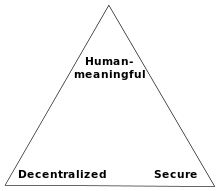Zooko's triangle is a trilemma of three properties that are generally considered desirable for names of participants in a network protocol:[1]
- Human-meaningful: Meaningful and memorable (low-entropy) names are provided to the users.
- Secure: The amount of damage a malicious entity can inflict on the system should be as low as possible.
- Decentralized: Names correctly resolve to their respective entities without the use of a central authority or service.
Overview
Zooko Wilcox-O'Hearn conjectured that no single kind of name can achieve more than two. For example: DNSSec offers a decentralized, human-meaningful naming scheme, but is not secure against compromise by the root; .onion addresses and bitcoin addresses are secure and decentralized but not human-meaningful; and I2P uses name translation services which are secure (as they run locally) and provide human-meaningful names - but fail to provide unique entities when used globally in a decentralised network without authorities.
Solutions
Several systems which exhibit all three properties of Zooko's triangle have now been created, including:
- Computer scientist Nick Szabo's paper "Secure Property Titles with Owner Authority" illustrated that all three properties can be achieved up to the limits of Byzantine fault tolerance.[2]
- Activist Aaron Swartz described a naming system based on Bitcoin employing Bitcoin's distributed blockchain as a proof-of-work to establish consensus of domain name ownership.[3] These systems remain vulnerable to Sybil attack,[4] but are secure under Byzantine assumptions.
Several platforms implement refutations of Zooko's conjecture, including: Twister (which use Swartz' system with a bitcoin-like system), Blockstack (separate blockchain), Namecoin (separate blockchain), Monero OpenAlias[5] and Ethereum Name Service.
See also
- Petname
- GNU Name System
References
- ^ Zooko Wilcox-O'Hearn. "Names: Decentralized, Secure, Human-Meaningful: Choose Two". Archived from the original on 20 October 2001.
- ^ Nick Szabo, Secure Property Titles, 1998
- ^ Aaron Swartz, Squaring the Triangle: Secure, Decentralized, Human-Readable Names, Aaron Swartz, 6 January 2011
- ^ Dan Kaminsky, Spelunking the Triangle: Exploring Aaron Swartz’s Take On Zooko’s Triangle, 13 January 2011
- ^ Monero core team (19 September 2014). "OpenAlias". Retrieved 3 February 2015.
External links
- Zooko Wilcox-O'Hearn, Names: Decentralized, Secure, Human-Meaningful: Choose Two – the essay highlighting this difficulty
- Marc Stiegler, An Introduction to Petname Systems – a clear introduction
- Nick Szabo, Secure Property Titles – argues that all three properties can be achieved up to the limits of Byzantine fault tolerance.
- Bob Wyman, The Persistence of Identity: Updating Zooko's Pyramid
- Paul Crowley, Squaring Zooko's Triangle
- Aaron Swartz, Squaring the Triangle using a technique from Bitcoin
